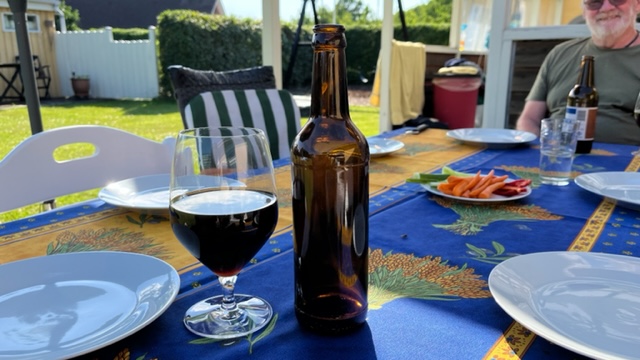Can You Brew Beer With Distilled Water? (5 Facts)

The whole process of beer brewing is about turning water into beer. It’s only natural that the kind of water you would use matters a lot.
You can brew beer with distilled water, but it is not recommended. Distilled water is deficient in nutrients needed for the yeast that helps turn water and beer ingredients into a flavorful drink. If you must use it, you need to add minerals in proper amounts.
This article will reveal why brewing beer with distilled water is a challenge and how you can work with it. Keep reading to learn more about brewing beer.
5 Facts You Need To Know Before Brewing Beer With Distilled Water
Although brewing beer with distilled water is highly discouraged by many brewers, there are specific scenarios where it may work out.
For instance, if you want a truly customized beer to suit your preferences, starting from scratch may help you get there, as I’ll explain later on. However, it’s not without its challenges.
Here are 5 things you need to know before using distilled water in beer brewing:
#1. Distilled Water Lacks Minerals Needed for Beer Brewing
There are many different kinds of water: tap, purified, distilled, rain, spring, etc. They all vary in source, filtration process, and mineral composition.
What Is Distilled Water?
Distilled water is the most purified type of water. Nearly all minerals and elements that used to be in it have been removed.
As the water evaporates in a distillation unit, it leaves behind most of its other content: iron, metals, nitrate, etc. Thus, when it’s condensed, it’s a blank canvas.
Why Is Distilled Water Not Good for Beer Brewing?
While the lack of minerals may seem like a good thing, it’s not for brewing. It’s virtually impossible to brew beer without yeast, either naturally occurring or manually added. That yeast needs minerals, and ideally, you get that from water.
Distilled water is not suitable for brewing because it lacks the minerals yeast needs. Yeast sources its nutrients from the water, and without it, they cannot ferment beer. Beer brewers discourage using distilled water, especially if you are a beginner.
#2. You Can Use Distilled Water When Brewing Malt Extracts
However, there is a way to circumvent the lack-of-minerals issue in distilled water. If the mash or extract you’re using can provide the necessary nutrients for your yeast, then it won’t have to rely on water.
There are three beer brewing methods: extract, partial mash, and all-grain. If you go all-grain, using distilled water would be extremely difficult. It would be like making a cake from scratch without half of the needed ingredients.
Distilled Water Can Be Used for Extract Brewing
In the extract brewing method, you use malt extract, which is processed grains. This extract contains the nutrients and minerals the yeast would need to work.
Distilled water can be used for extract brewing since it wouldn’t be the primary source of minerals.
There are several malt extracts available, and you can read about some of them in this article about how beer is made.
#3. You Can Use Distilled Water To Build a Water Profile
Even though distilled water is not recommended for brewing beer, many beer brewers are still up for it to have the chance to build a beer’s water profile. It’s quite challenging but it can be worthwhile.
If you choose that road, there are things you need to monitor and incorporate into the water for the whole setup to work. These include pH value, amount of minerals, kind of minerals, etc.
However, you’ll be treading on eggshells. If the pH goes too low or too high, the yeast could die or not grow. The same goes for temperature.
Meanwhile, if nutrients are added in too high or too low amounts, they could make the flavors feel off. That brings us to the next point in this article: balance is crucial in beer brewing.
#4. Balance Is Crucial in Brewing Beer With Distilled Water
Building a water profile from distilled water is not as easy as bringing the water pH level to the optimal range for yeast, which is around 5.2.
For instance, if your distilled water has a pH of around 7 (as it ideally should be), you’d have to lower the pH to 5.2, which would mean making it more acidic.
However, you cannot just add acid until the pH is 5.2. That would very much affect the taste profile of your beer, giving you a very sour drink. Even if you were aiming for a sour beer, it would still be too risky. If you’re curious about that, check my article on how to make sour beer.
If you are making beer from distilled water, make sure you understand the balance you need for your target beer and how to achieve it.
Minerals Needed for Beer Brewing
To help you out with this dilemma, I’ve listed some of the most crucial nutrients and minerals you’ll need for beer brewing:
| Mineral | Effect/Importance | Source |
| Calcium | Lowers pH Improve beer flavor Increase water hardness | calcium chloride, calcium sulfate, calcium carbonate |
| Magnesium | Improve beer flavor Yeast nutrient Lowers pH | Epsom salt, magnesium sulfate |
| Sodium | Improve beer flavor | table salt, baking soda |
| Carbonate | Improve beer flavor | baking soda |
| Sulfate | Improve beer flavor Yeast nutrient (specific yeast strains) Lowers pH | Epsom salt, gypsum, magnesium sulfate |
| Acid | Lowers pH Improve beer flavor | lactic acid |
| Calcium carbonate | Increases pH | Calcium carbonate |
You need to be careful when adding these minerals as too much of them can destroy your beer’s profile. For instance, salt helps bring out the beer’s taste, but too much of it and you might end up sipping sea and alcohol.
#5. You Can Use Distilled Water To Soften Tap or Hard Water
After all I’ve said about distilled water, you might be thinking about using tap or hard water for beer brewing in order to have a source of ample nutrients. However, this is not recommended either.
Tap water has excess minerals and chemicals that may affect the beer brewing process. However, that doesn’t mean you can’t use it entirely.
A trick beer brewers use is to mix distilled and tap water together. Distilled water does not add minerals as it doesn’t have any, and it can soften the ones that tap water has in excess.
Filtered water is considered to have the perfect balance between mineral richness and purity for brewing beer. Mixing distilled water and tap water can achieve a similar result.
Final Thoughts
Brewing beer is chemistry: the ingredients have to work together and be in the right balance. Such balancing is harder to do when using distilled water because it doesn’t have the minerals or nutrients that yeast needs.
However, if the right minerals in the right amounts are incorporated correctly, the right balance can still be achieved, and you can make a beer suited to your tastes.



